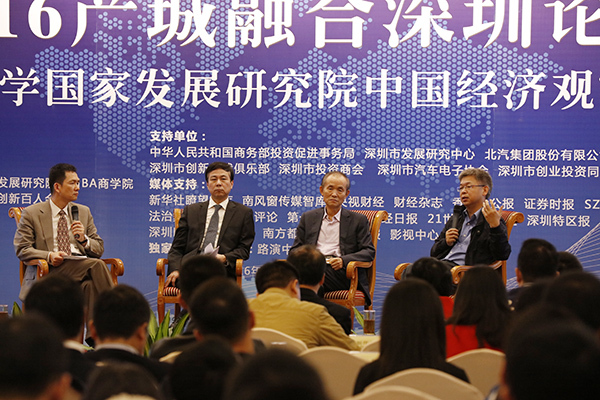

On 17 January 2016, the 46th China Economic Observer conference, organized by Peking University National School of Development and BiMBA Business School, was held in Shenzhen. Peking University National School of Development (“NSD”) Professors Song Guoqing, Huang Yiping, Lu Feng and NSD Dean Yao Yang were in attendance. During this forum, the NSD also announced its future partnership with Shenzhen Futian government and industries in a number of projects. The NSD has designated Futian as a “reform and development policy research pilot observation area”.
Prof. Yao Yang: Top Think-tank and Transitioning City Go Hand-in-Hand
NSD Dean Prof. Yao Yang began by introducing the NSD’s history and positioning as well as its academic programs and latest developments in its South-South cooperation. Dean Yao stated the NSD and its BiMBA Business School cultivate leaders in academia and business and, with developments in South-South cooperation, will help it become a meeting point for leaders in the academic, commercial and political arenas. As a top think-tank, it wishes to and should increase cooperation with Shenzhen city, which is at the forefront of reform and opening up. As Shenzhen explores transition and development, there is value in a think-tank’s research into development. This will not only help Shenzhen’s development but also serve as a useful reference point for China’s own transition and indeed have value for other developing countries.
Huang Yiping: Fintech Encourages China’s Economic Transition
Professor Huang Yiping stated that currently, there is strong downward pressure on the Chinese economy as traditional labor intensive jobs no longer have a competitive advantage, heavy industry is oversupplied and emerging industries have not yet reached scale. Whilst China has created a huge financial system in the past decades, but this system is still fairly suppressed, particularly for small and medium enterprise financing which is difficult and expensive. It is difficult to reform this system, which does not support emerging industries and start-ups and can be a hindrance to economic growth.
Lu Feng: Understanding Structural Reform
During Prof. Lu Feng’s presentation, he highlighted a key feature in China’s economic path in the last few decades: dual adjustments – a periodic adjustment and structural adjustment. If structural reform can be effectively implemented, results will positive in spite of inevitable pains. Prof. Lu gave a number of suggestions: first, management of aggregate demand and structural reform must be in concert – a focus on the stock market, foreign exchange market and risk linkage, so that structural reform can bring a stable macroeconomic environment. Second, to take into account the effect of structural reform on the labor market – enterprises leaving the industry should focus on repaying owed wages to workers. Third, to consider expediting agricultural land reform. Fourth, to take into account food policy. Fifth, pushing forward reform has painful consequences – e.g. dealing with zombie businesses.
Song Guoqing: Global Investment Market Analysis
Prof. Song Guoqing analyzed China’s current investment landscape. He stated that, from the demand-side, the world is largely bordering on monetary contraction. The US may already be experiencing this and possibly in the short-term will not be able to escape it. Japan and Europe are in a worse situation than the US and therefore the global outlook from a demand perspective is not very positive. Prof. Song believes that when examining the demand side, there is one big change that must be noted: in the past external demand factors have largely influenced China whilst today China’s demand exerts a large influence on the outside world. This analysis was also given during his speech to BiMBA and NSD alumni last year, and in 2015 China’s stock market and forex market effect on world markets was proof of this.
Overseen by Prof. Yao Yang, a Q&A session was held after the three professors’ talks. The forum was attended by over 200 entrepreneurs, journalists and NSD BiMBA alumni.